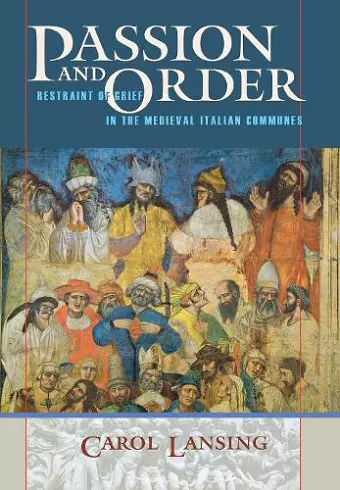Passion and Order
Restraint of Grief in the Medieval Italian Communes
Format:Hardback
Publisher:Cornell University Press
Published:4th Jan '08
Currently unavailable, and unfortunately no date known when it will be back

The way in which a society expresses grief can reveal how it views both intense emotions and public order. In thirteenth-century Italian communes, a conscious effort to change appropriate public reaction to death threw into sharp relief connections among urban politics, gender expectations, and understandings of emotionality. In Passion and Order, Carol Lansing explores a dramatic change in thinking and practice about emotional restraint. This shift was driven by politics and understood in terms of gender. Thirteenth-century court cases reveal that male elites were accustomed to mourning loudly and demonstratively at funerals. As many as a hundred men might gather in a town's streets and squares to weep and cry out, even tear at their beards and clothing. Yet these elites enacted laws against such emotional display and proceeded to pay the fines levied against themselves for violating their own legislation.
Political theorists used gender norms to urge men to restrain their passions; histrionic grieving, like lust, was now considered "womanish." Lawmakers drew on a complex of gendered ideas about grief and public order to characterize governance in ways that linked the self and the state. They articulated their beliefs in terms of rules of decorum, how men and women need to behave in order to live together in society. Lansing demonstrates this change through a rich combination of sources: archival records from Orvieto, Bologna, and Perugia; political treatises; literary works, notably Petrarch's letters; and representations of grief in painting and sculpture.
"If Carol Lansing is not already the leading Anglo-American historian of the Italian High Middle Ages, her Passion and Order: Restraint of Grief in the Italian Communes emphatically establishes her in that position. Lansing in a tour de force synthesizes vast bodies of ancient and medieval research on such varied subjects as medieval theology, painting, philosophy, consolatory literature, romances, Petrarch, and gender studies. In the end, Lansing examines the role of these changes in laws on grief in the formation of the Renaissance territorial state. This book provides the occasion for non-specialists to discover the best of contemporary reflection on medieval history and its place in Western history. It is also a pleasure to read." -- James Banker, North Carolina State University
"In this brilliantly researched book, Carol Lansing identifies a significant cultural shift in which men gave up emotional displays of grief. In tracing the promulgation and enforcement of the laws in restraint of grief in the medieval Italian communes, Lansing shows how a well-ordered state required political men capable of decorous behavior, and almost by default women came to bear the burden of public grieving alone and to be stigmatized for disorderly displays of emotion that had once been a male prerogative." -- Edward Muir, Clarence L. Ver Steeg Professor in the Arts and Sciences, Northwestern University
"This is a bold and generous book. Carol Lansing addresses central historical issues—the emergence of the state, the centrality of gender categories—in this wide-ranging and immensely stimulating cultural history of the expression of grief in medieval Italian cities. Her learned and thoughtful exposition will engage both experts and students alike. With Lansing we enter deeply into the pleasures of the historian's craft: the surprising questions provoked by an archival discovery; the intriguing clues offered by myriad sources in the search for meaning; the immense satisfaction of understanding the medieval world and ours better at the end of a thoughtful and disciplined analysis. One feels nearly guilty for enjoying so thoroughly a book about death and heart-rending grief, but Lansing's humane and searching inquiry reveals remarkable creativity in the midst of searing loss." -- Maureen C. Miller, University of California, Berkeley
- Winner of Winner of the 2008 Howard R. Marraro Prize (Americ.
ISBN: 9780801440625
Dimensions: 235mm x 155mm x 22mm
Weight: 907g
264 pages